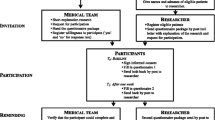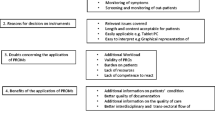Abstract
Purpose
Systematic assessment of QOL and care needs was applied in two gastroenterology departments to support “Cancer Care for the Whole Patient.”
Methods
Patients with digestive cancer were asked to complete the Cancer Rehabilitation Evaluation System-Short Form (CARES-SF) at the start of treatment and 3 months later. Both times CARES data were processed, and summary reports on the retained insights were sent to the reference nurse for use in further follow-up of the patient. Patients’ and reference nurse’s experiences with the systematic CARES-assessment were explored with several survey questions and semi-structured interviews, respectively.
Results
The mean age of the 51 participants was 63 years (SD11.17), 52.9% was male. With the CARES-SF, a large variety of problems and care needs was detected. Problems most frequently experienced, and most burdensome for QOL are a mix of physical complaints, side effects from treatment, practical, relational, and psychosocial difficulties. Only for a limited number of experienced problems a desire for extra help was expressed. All patients positively evaluate the timing and frequency of the CARES-assessment. The majority believes that this assessment could contribute to the discussion of problems and needs with healthcare professionals, to get more tailored care. Reference nurses experienced the intervention as an opportunity to systematically explore patients’ well-being in a comprehensive way, leading to detection and discussion of specific problems or needs in greater depth, and more efficient involvement of different disciplines in care.
Conclusions
Systematic QOL and needs assessment with the CARES-SF in oncology can contribute to more patient-centeredness and efficiency of care.

Similar content being viewed by others
Data availability
The datasets analyzed during the current study are available from the corresponding author on reasonable request.
Abbreviations
- CARES :
-
Cancer Rehabilitation Evaluation System
- CARES-SF :
-
Cancer Rehabilitation Evaluation System-Short Form
- IOM :
-
Institute of Medicine
- PROM :
-
patient reported outcome measure
- QOL :
-
quality of life
References
Armes J, Crowe M, Colbourne L, Morgan H, Murrells T, Oakley C, Palmer N, Ream E, Young A, Richardson A (2009) Patients’ supportive care needs beyond the end of cancer treatment: a prospective, longitudinal survey. J Clin Oncol 27(36):6172–6179. https://doi.org/10.1200/JCO.2009.22.5151
Boyes AW, Girgis A, D'Este C et al (2012) Prevalence and correlates of cancer survivors' supportive care needs 6 months after diagnosis: a population-based cross-sectional study. BMC Cancer 12:150. https://doi.org/10.1186/1471-2407-12-150
Harrison JD, Young JM, Price MA, Butow PN, Solomon MJ (2009) What are the unmet supportive care needs of people with cancer? A systematic review. Support Care Cancer 17(8):1117–1128. https://doi.org/10.1007/s00520-009-0615-5
Ozgen Z, Ozden S, Atasoy BM et al (2015) Long-term effects of neoadjuvant chemoradiotherapy followed by sphincter-preserving resection on anal sphincter function in relation to quality of life among locally advanced rectal cancer patients: a cross-sectional analysis. Radiat Oncol (London, England) 10:168. https://doi.org/10.1186/s13014-015-0479-4
Marventano S, Forjaz M, Grosso G et al (2013) Health related quality of life in colorectal cancer patients: state of the art. BMC surgery 13(Suppl 2):S15. https://doi.org/10.1186/1471-2482-13-s2-s15
Institute of Medicine (2001) Crossing the Quality Chasm: A New Health System for the 21st Century. National Academy Press, Washington, D.C
Wen KY, Gustafson DH (2004) Needs assessment for cancer patients and their families. Health Qual Life Outcomes 2:11. https://doi.org/10.1186/1477-7525-2-11
Richardson A, Medina J, Brown V et al (2007) Patients’ needs assessment in cancer care: a review of assessment tools. Support Care Cancer 15(10):1125–1144. https://doi.org/10.1007/s00520-006-0205-8
Carlson LE, Waller A, Mitchell AJ (2012) Screening for distress and unmet needs in patients with cancer: review and recommendations. J Clin Oncol 30(11):1160–1177. https://doi.org/10.1200/Jco.2011.39.5509
Ganz PA, Schag CA, Lee JJ et al (1992) The CARES: a generic measure of health-related quality of life for patients with cancer. Qual Life Res 1(1):19–29
Schag CA, Heinrich RL (1989) Cancer rehabilitation evaluation system (CARES) manual, ed. 1. CARES Consultants, Los Angeles
Schag CA, Heinrich RL (1990) Development of a comprehensive quality of life measurement tool: CARES. Oncology (Williston Park) 4(5):135–138 discussion 147
Ganz PA, Hirji K, Sim MS et al (1993) Predicting psychosocial risk in patients with breast cancer. Med Care 31(5):419–431
Ganz PA, Rowland JH, Desmond K et al (1998) Life after breast cancer: understanding women’s health-related quality of life and sexual functioning. J Clin Oncol 16(2):501–514
Gotay CC, Moinpour CM, Unger JM et al (2007) Impact of a peer-delivered telephone intervention for women experiencing a breast cancer recurrence. J Clin Oncol 25(15):2093–2099 Language: English. Entry Date: 20080201. Revision Date: 20150711. Publication Type: Journal Article
Libert Y, Merckaert I, Slachmuylder JL et al (2013) The ability of informal primary caregivers to accurately report cancer patients’ difficulties. Psycho-Oncology 22(12):2840–2847. https://doi.org/10.1002/pon.3362
Rosenberg SM, Tamimi RM, Gelber S et al (2014) Treatment-related amenorrhea and sexual functioning in young breast cancer survivors. Cancer 120(15):2264–2271. https://doi.org/10.1002/cncr.28738
Saevarsdottir T, Fridriksdottir N, Gunnarsdottir S (2010) Quality of life and symptoms of anxiety and depression of patients receiving cancer chemotherapy: longitudinal study. Cancer Nurs 33(1):E1–E10. https://doi.org/10.1097/NCC.0b013e3181b4adb5
Zimmermann C, Swami N, Krzyzanowska M et al (2014) Early palliative care for patients with advanced cancer: a cluster-randomised controlled trial. Lancet 383(9930):1721–1730. https://doi.org/10.1016/s0140-6736(13)62416-2
Schouten B, Hellings J, Van Hoof E et al (2016) Validation of the flemish CARES, a quality of life and needs assessment tool for cancer care. BMC Cancer 16:696. https://doi.org/10.1186/s12885-016-2728-9
Schouten B, Hellings J, Vankrunkelsven P et al (2017) Qualitative research on the Belgian Cancer Rehabilitation Evaluation System (CARES): an evaluation of the content validity and feasibility. J Eval Clin Pract. https://doi.org/10.1111/jep.12681
Schouten B, Van Hoof E, Vankrunkelsven P et al (2016) Assessing cancer patients’ quality of life and supportive care needs: translation-revalidation of the CARES in Flemish and exhaustive evaluation of concurrent validity. BMC Health Serv Res 16(1):86. https://doi.org/10.1186/s12913-016-1335-4
te Velde A, Sprangers MA, Aaronson NK (1996) Feasibility, psychometric performance, and stability across modes of administration of the CARES-SF. Ann Oncol 7(4):381–390
Wieldraaijer T, Duineveld LA, van Asselt KM et al (2016) Follow-up of colon cancer patients; causes of distress and need for supportive care: results from the ICARE Cohort Study. Eur J Surg Oncol. https://doi.org/10.1016/j.ejso.2016.08.011
Admiraal JM, van Nuenen FM, Burgerhof JG et al (2016) Cancer patients’ referral wish: effects of distress, problems, socio-demographic and illness-related variables and social support sufficiency. Psycho-Oncology 25(11):1363–1370. https://doi.org/10.1002/pon.4067
Lambert SD, Kelly B, Boyes A et al (2014) Insights into preferences for psycho-oncology services among women with gynecologic cancer following distress screening. J Natl Compr Canc Netw 12(6):899–906
Thalen-Lindstrom A, Glimelius B, Johansson B (2017) Development of anxiety, depression and health-related quality of life in oncology patients without initial symptoms according to the Hospital Anxiety and Depression Scale - a comparative study. Acta Oncol (Stockh, Sweden) 56(8):1094–1102. https://doi.org/10.1080/0284186x.2017.1305124
Thorne S, Hislop TG, Kim-Sing C et al (2014) Changing communication needs and preferences across the cancer care trajectory: insights from the patient perspective. Support Care Cancer 22(4):1009–1015. https://doi.org/10.1007/s00520-013-2056-4
Pereira JL, Chasen MR, Molloy S et al (2016) Cancer care professionals’ attitudes toward systematic standardized symptom assessment and the Edmonton Symptom Assessment System after large-scale population-based implementation in Ontario, Canada. J Pain Symptom Manag 51(4):662–672.e8. https://doi.org/10.1016/j.jpainsymman.2015.11.023
Thayssen S, Hansen DG, Sondergaard J et al (2015) Completing a questionnaire at home prior to needs assessment in general practice: a qualitative study of cancer patients’ experience. Patient. https://doi.org/10.1007/s40271-015-0144-x
Biddle L, Paramasivan S, Harris S, Campbell R, Brennan J, Hollingworth W (2016) Patients’ and clinicians’ experiences of holistic needs assessment using a cancer distress thermometer and problem list: a qualitative study. Eur J Oncol Nurs 23:59–65. https://doi.org/10.1016/j.ejon.2016.04.004
Acknowledgements
We would like to acknowledge the gastroenterology departments who were willing to work with us for this pilot study. Also we would like to thank Limburg Sterk Merk (LSM) for funding the PhD-project of Bojoura Schouten.
Author information
Authors and Affiliations
Contributions
Study conceptualization and design: BS, JH, DDJ, JD, MA, DW, PV.
Data collection: BS, DDJ, MA.
Study coordination, data analysis, and drafting the paper: BS.
Revision of the paper: JH, DDJ, JD, MA, DW, PV.
All authors read and approved the final manuscript.
Corresponding author
Ethics declarations
Conflict of interest
The authors declare that they have no conflict of interest.
Ethical approval
All procedures performed in studies involving human participants were in accordance with the ethical standards of the institutional research committees.
Informed consent
Informed consent was obtained from all individual participants included in the study.
Additional information
Publisher’s Note
Springer Nature remains neutral with regard to jurisdictional claims in published maps and institutional affiliations.
Electronic supplementary material
ESM 1
(DOCX 48 kb)
Rights and permissions
About this article
Cite this article
Schouten, B., De Jonckheere, D., Aerts, M. et al. An explorative study on systematic assessment of QOL and care needs with the CARES-SF in the early follow-up of patients with digestive cancer. Support Care Cancer 27, 2715–2724 (2019). https://doi.org/10.1007/s00520-018-4565-7
Received:
Accepted:
Published:
Issue Date:
DOI: https://doi.org/10.1007/s00520-018-4565-7




